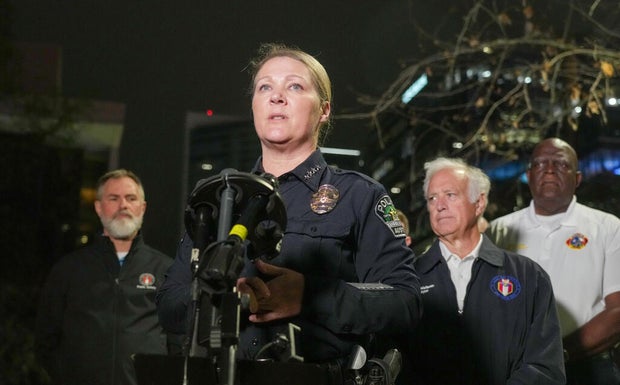News
A venture capital grant program for Black women officially ends after court ruling

The Fearless Fund, an Atlanta-based venture capital firm, will shutter its grant program for Black women as part of a settlement, ending a year-long affirmative action battle. Here, co-founders and CEOs of The Fearless Fund Arian Simone (center left) and Ayana Parsons (center right) speak to journalists outside federal court in Miami on Jan. 31.
Rebecca Blackwell/AP
hide caption
toggle caption
Rebecca Blackwell/AP
The Fearless Fund, an Atlanta-based venture capital fund, announced it will permanently close its grant program for Black women business owners after a year-long battle over racial discrimination.
In a Wednesday court filing, attorneys representing conservative activist Edward Blum and the Atlanta-based venture fund wrote that both parties “have settled,” asking the court to permanently dismiss the case.
Both parties said the Fearless Fund agreed to permanently close its Fearless Strivers Grant contest, which awards $20,000 to small businesses led by at least one woman of color and other requirements.
“As of today, the Fearless Fund has permanently closed the grant contest and will never reopen it,” the American Alliance for Equal Rights, a conservative group founded by Blum, told NPR in a statement Wednesday.
“The American Alliance for Equal Rights encouraged the Fearless Fund to open its grant contest to Hispanic, Asian, Native American and white women, but Fearless has decided instead to end it entirely,” the statement added.
Alphonso David, one of the lead attorneys representing the Fearless Fund, told NPR that the settlement is a “positive outcome” for the capital firm.
“The agreement is very narrow and does not restrict or relate to any other investment or charitable activity of the Fearless Fund or the Foundation going forward,” David said. “The Fearless Fund can now continue their work toward expanding economic opportunity.”
The settlement between the venture firm and the conservative group ends one of the most high-profile affirmative action cases in recent years. It also comes as diversity, equity and inclusion initiatives at universities, businesses and other organizations have come under attack.
In August 2023, the American Alliance for Equal Rights sued the Fearless Fund and its foundation over the Strivers Grant, alleging it was “racially discriminatory” against non-Black business owners.
The National Venture Capital Association, a trade group with hundreds of member venture capital firms, filed an amicus brief defending the Fearless Fund’s grant program. The trade group called the grant program a “modest but important” step toward creating equal opportunity for Black women. Only 2% of investment professionals at venture capital firms were Black women in 2022, according to a Deloitte and Venture Forward study.

However, in a 2-1 ruling in June, a U.S. federal court of appeals suspended the venture firm’s program and ruled against Fearless Fund. The ruling also reversed a federal judge’s ruling last year that the contest for the $20,000 grant should continue, saying that Blum’s lawsuit was likely to fail.

Conservative activist Edward Blum speaks at a news conference in Washington, D.C., on June 29, 2023.
Jose Luis Magana/AP
hide caption
toggle caption
Jose Luis Magana/AP
Blum applauded the June ruling, saying that such programs, like the Strivers Grant, “exclude certain individuals because of their race” and are “unjust and polarizing.”
Blum, 72, has worked for years to overturn affirmative action policies in colleges and universities. In 2023, he won a major legal victory when the Supreme Court effectively ended race-conscious policies in higher education.
In addition the lawsuit against the Fearless Fund, the Alliance has also filed at least nine other suits against companies and organizations — such as Southwest Airlines, Amazon, Meta and the Smithsonian’s National Museum of the American Latino over racial requirements and efforts.

News
Satellite images provide view inside Iran at war

Smoke rises over Konarak naval base in southern Iran on Sunday. The base was one of hundreds of targets of U.S. and Israeli forces throughout the country.
Planet Labs PBC
hide caption
toggle caption
Planet Labs PBC
Commercial satellite images are providing a unique look at the extent of damage being done to Iran’s military facilities across the country.
The U.S. and Israeli military campaign opened with a daytime attack that struck Iranian leadership in central Tehran. Smoke was still visible rising from Ayatollah Ali Khamenei’s compound following the attack that killed the supreme leader.

An image by the company Airbus taken on Saturday shows the aftermath of an Israeli strike on Iran’s Leadership House in central Tehran. Iran’s Supreme Leader Ayatollah Ali Khamenei was killed in the opening wave of attacks.
Pléiades Neo (c) Airbus DS 2026
hide caption
toggle caption
Pléiades Neo (c) Airbus DS 2026
Israel and the U.S. have gone on to strike targets across the country. Reports on social media indicate that there have been numerous military bases and compounds attacked all over Iran, and Iran has responded with attacks throughout the Middle East.
U.S. forces have also been striking at Iran’s navy. In a post on his social media platform, President Trump said that he had been briefed that U.S. forces had sunk nine Iranian naval vessels. U.S. Central Command did not immediately confirm that number but it did say it had struck an Iranian warship in port.

An image captured on Saturday shows a ship burning at Iran’s naval base at Konarak.
Satellite image ©2026 Vantor
hide caption
toggle caption
Satellite image ©2026 Vantor
Numerous satellite images show burning vessels at Konarak naval base in southern Iran. Images also show damage to a nearby airbase where hardened hangers were struck by precision munitions.

Hardened aircraft shelters at Konarak airbase were struck with precision munitions.
Satellite image ©2026 Vantor
hide caption
toggle caption
Satellite image ©2026 Vantor
And there was extensive damage at a drone base in the same area. Iran has launched numerous drones and missiles toward Israel and U.S. military installations in Bahrain, Kuwait and Qatar. Many drones have been intercepted but videos on social media show that some have evaded air defenses and caused damage in nearby Gulf countries. In Dubai, debris from an Iranian drone damaged the iconic Burj Al Arab, according to a statement from Dubai’s government.

Buildings at an Iranian drone base at Konarak were destroyed in the strikes.
Satellite image ©2026 Vantor
hide caption
toggle caption
Satellite image ©2026 Vantor
Iran’s most powerful weapons are its long-range missiles. The Iranian Revolutionary Guards have hidden the missiles deep inside mountain tunnels. Images taken Sunday in the mountains of northern Iran indicate that some of those tunnels were hit in a wave of strikes.
Following Khamenei’s death, Iran declared 40 days of mourning. Satellite images showed mourners gathering in Tehran’s Enghelab square on Sunday.
Iranian Foreign Ministry Spokesperson Esmail Baghaei told NPR on Sunday that Iran will continue to fight “foreign aggression, foreign domination.”
A White House official told NPR that Trump plans to talk to Iran’s interim leadership “eventually,” but that for now, U.S. operations continue in the region “unabated.”

A large crowd of mourners fill Enghelab Square in Tehran on Sunday, following the death of Iran’s Supreme Leader Ayatollah Ali Khamenei, who was killed in an Israeli airstrike.
Satellite image ©2026 Vantor
hide caption
toggle caption
Satellite image ©2026 Vantor
News
Video: What the Texas Primary Battle Means for the Midterms

new video loaded: What the Texas Primary Battle Means for the Midterms
By J. David Goodman, Alexandra Ostasiewicz, June Kim and Luke Piotrowski
March 1, 2026
News
Mass shooting at Austin, Texas bar leaves at least 3 dead, 14 wounded, authorities say

Gunfire rang out at a bar in Austin, Texas, early Sunday and at least three people were killed, the city’s police chief said.
Austin Police Chief Lisa Davis told reporters the shooter was killed by officers at the scene.
Fourteen others were hospitalized and three were in critical condition, Austin-Travis County EMS Chief Robert Luckritz said.
“We received a call at 1:39 a.m. and within 57 seconds, the first paramedics and officers were on scene actively treating the patients,” Luckritz said.
There was no initial word on the shooter’s identity or motive.
Davis noted how fortunate it was that there was a heavy police presence in Austin’s entertainment district at the time, enabling officers to respond quickly as bars were closing.
“Officers immediately transitioned … and were faced with the individual with a gun,” Davis said. “Three of our officers returned fire, killing the suspect.”
She called the shooting a “tragic, tragic” incident.
Austin Mayor Kirk Watson said his heart goes out to the victims, and he praised the swift response of first responders.
“They definitely saved lives,” he said.
Davis said federal law enforcement is aiding the investigation.
-

 World4 days ago
World4 days agoExclusive: DeepSeek withholds latest AI model from US chipmakers including Nvidia, sources say
-

 Massachusetts4 days ago
Massachusetts4 days agoMother and daughter injured in Taunton house explosion
-

 Montana1 week ago
Montana1 week ago2026 MHSA Montana Wrestling State Championship Brackets And Results – FloWrestling
-

 Denver, CO4 days ago
Denver, CO4 days ago10 acres charred, 5 injured in Thornton grass fire, evacuation orders lifted
-

 Louisiana7 days ago
Louisiana7 days agoWildfire near Gum Swamp Road in Livingston Parish now under control; more than 200 acres burned
-

 Technology1 week ago
Technology1 week agoYouTube TV billing scam emails are hitting inboxes
-

 Technology1 week ago
Technology1 week agoStellantis is in a crisis of its own making
-

 Politics1 week ago
Politics1 week agoOpenAI didn’t contact police despite employees flagging mass shooter’s concerning chatbot interactions: REPORT


















